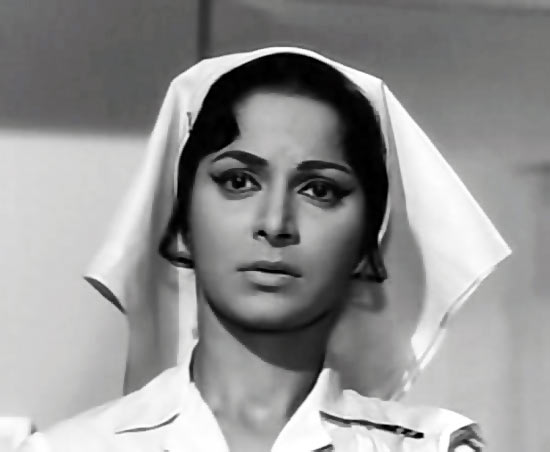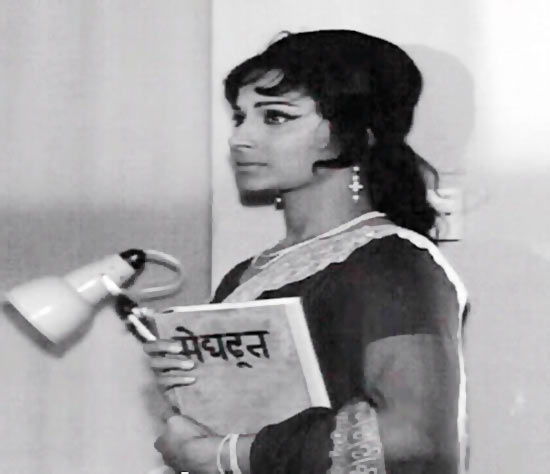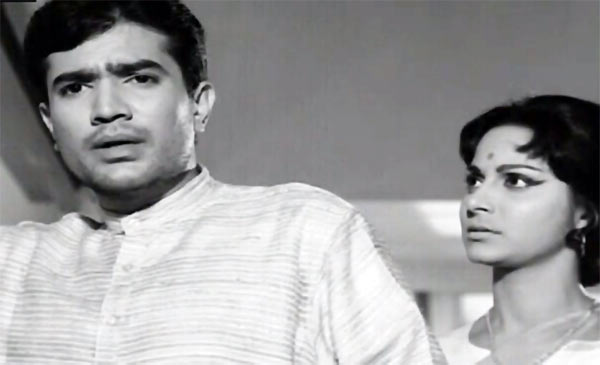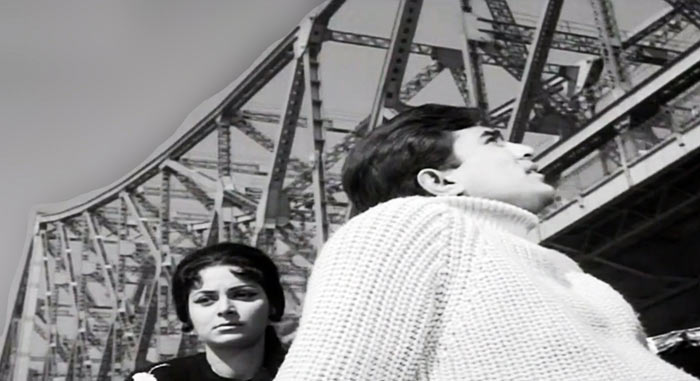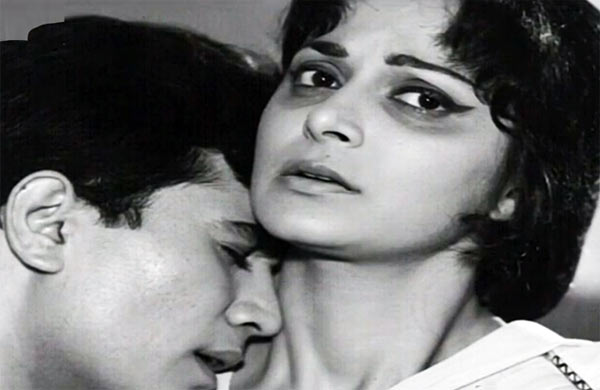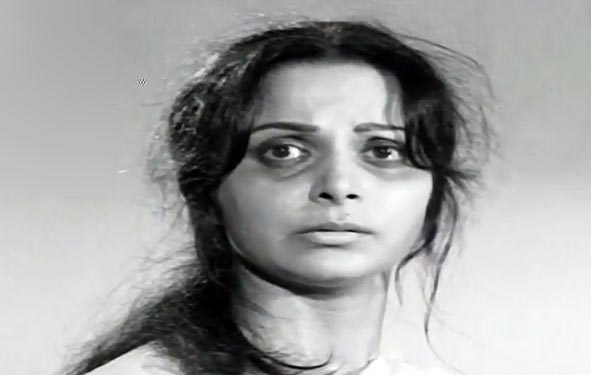 | « Back to article | Print this article |
Waheeda Rehman's haunting melancholy in Khamoshi
In this special series, we re-visit great Hindi film classics. Today, we look back at Waheeda Reman and Rajesh Khanna's 1969 film Khamoshi.
‘Main nurse hoon na. Bujhte saanson ka deep jalaye-jalaye hi mera farz hai.’
Kindness respires in the word ‘nurse’ both as a role and action. But what if her unconditional nurturing and consideration in the garb of research/treatment sows seeds of attachment and an undisclosed need for reciprocation?
Asit Sen’s Khamoshi documents the bitter heartbreak and irony that ensues in his 1969 black and white classic, Khamoshi.
Based on Ashutosh Mukherjee’s short story, Nurse Mitra, which Sen adapted a decade before in Bengali as Deep Jwele Jaai led by a stellar Suchitra Sen, Khamoshi comes alive in Waheeda Rehman’s wistful eyes and Hemant Kumar’s haunting score.
Click Next to read more.
Khamoshi's lyrical melancholy
One of its most iconic moments is rousing as ever -- a sad but stunning Rehman embracing Kalidas’ Meghdoot in her arms, unhurriedly ascends the stairs, clad in a bordered chiffon sari that gently traipses her steps, a mellow whistle serenades the breeze, a young man stands contemplating by the balcony (someone we seldom see but clearly identify) and Hemantda’s soulful appeal Tum-mmmm pukaar lo fills the suddenly bare hospital and an unquestionably awed screen with hypnotic allure.
Khamoshi owes much of its success to such lyrical melancholy.
Most of it is exhibited through the expressive emotionality of Waheeda Rehman. All the cat eyeliner in the world cannot accentuate her glimmering, compelling orbs, which speak volumes even when she does not. (Though the legendary leading lady believes her critically-acclaimed work here is nowhere as perfect as the original Radha -- Suchitra Sen’s unaffected performance.)
Director Sen sets the premise of her inner conflict in a fascinating manner. From the first scene itself, the viewer is informed of the reason behind nurse Radha’s desolation (Rehman). The writings in her diary reveal her genuine disappointment over Dev’s (Dharmendra) gratitude when she expected more, much more.
Here’s why.
Radha is assigned to comfort Dev, a psychiatric patient, by Dr Colonel Saab (Nasir Hussain in a role screaming for Ashok Kumar) in a specialised manner to prove his theory of how compassion in a woman can cure a man of his mental illness without resorting to electrocution or heavy-duty medication.
His ‘since God couldn’t be present everywhere, he created woman’ argument sounds like a pretty compliment but doesn’t serve convincing as the basis of a medical thesis.
And so what starts out as another day at work ends up taking a lot more out of Radha than she had bargained for. The nurse in her tends to the despairing Dev’s insecurity and anxiety but the woman inside is drawn to the devastatingly beautiful man on the surface.
Thrust into constant intimacy, Radha finds herself hopelessly tangled in a muddle of empathy and expectations.
Radha's fate
Tragically, Dev doesn’t remember any of that closeness after recovery and regards her service with appreciation.
Interestingly, none of this is depicted in flashbacks or third acts but implied throughout in dialogues or fleeting glimpses that take special care in not revealing Dharmendra’s face to the camera, which (masterful cinematography by Filmfare awar recipient Kamal Bose) renders him surreal, unattainable and, thus, even more significant to the story.
What I just described to you isn’t even the story; it’s just the basis of why Radha’s fate in the final scene is all the more crushing.
What transpired with Dev, Radha, the devoted nurse, took in her stride but left Radha, the woman in love, shattered.
But she keeps mum then.
And again when asked why she’s reluctant to take up another similar case of acute mania -- Arun (Rajesh Khanna), whose recuperation using the same method can verify Dr Colonel’s notion as not a fluke.
In one poignant scene, bearing the Gulzar (credited for dialogues/lyrics) stamp all over, Arun tells Radha, ‘Mujhe toh sirf shuruvat maloom hai kahani ki. Anth nahi.’
‘Anth mujhe maloom hai, Arun babu,’ remarks Radha in a somewhat hushed tone that is both conscious of and dreading the looming deja vu.
Romance drama isn't too long drawn out
By limiting its running time to a little less than two hours duration, Sen ensures the romance drama doesn’t get too long drawn out or soppy.
He alternates the serious bits with comic interludes that portray disturbed minds as animated loonies. They don’t contribute in the actual screenplay nor fulfill their function of providing an authentic ambiance.
Having said that, Deven Varma stands out as a man who’s lost his mind over his allegedly starving kids. There’s a depressing backstory lurking in somewhere but Khamoshi has enough of that already on its platter to probe.
Another sub-plot is the one involving Radha’s tackling of the woman behind Arun’s insane behavior.
What redeems the clunky acting in this particular episode is Gulzar’s glorious penmanship and Lata Mangeshkar’s magnificent delivery of the song, Humne dekhi hai un aankhon ki mehakti khushboo, haath se chookar inhe rishton ka ilzaam na do, which plays more than a couple of times in the movie.
Soothing tunes
Music is the ethereal voice, the sublime soul of Radha’s Khamoshi.
Hemant Kumar, who also produced the film, composes a sound that is soothing, secluded and untouched.
Gulzar’s stirring poetry in Tum pukaar lo, Woh shaam kuch ajeeb thi, Humne dekhi hai and Aaj ki raat charagon blends seamlessly with former’s magical strains and offers its singers -- Kishore Kumar, Lata Mangeshkar, Aarti Mukherjee and Hemant da himself -- some of the best songs of their careers.
Even the picturisation by Sen is particularly pleasing.
Although most of Khamoshi unfolds in the dull, stark confines of a medical institution, it steps out in fresh air for the boat song, Woh shaam kuch ajeeb thi against the majestic Howrah Bridge.
Around the late 1960s, Rajesh Khanna was just a newbie while Rehman, at 33, one of Hindi cinema’s biggest stars. Unable to memorize the lyrics, he’d bank of his seasoned co-star to prompt him the lines.
Turns out, Kaka has a quite a few hit boat songs to his credit -- Chingari koi bhadke (Amar Prem), Jis gali mein tera ghar (Kati Patang) and Yunhi tum mujhse pyaar karti ho (Sachcha Jhutha).
Waheeda Rehman leaves us truly stunned
While we never quite come face to face with Dharmendra, his impact is unprecedented.
In comparison, Rajesh Khanna enjoys a full-fledged role, which he carries out with a mix of raw vulnerability and unconcealed awkwardness. His interpretation of acute mania may seem more like jilted lover syndrome to today’s viewer.
Being self-conscious of his senior heroine only helps in underscoring Rehman’s designation as the nurturer and Khanna’s as recipient.
Asit Sen was keen on Dev Anand for the role but Rehman later revealed that Sanjeev Kumar was better suited for the part. The latter, as a matter of fact, played a similar role in Khilona, which came out soon after Khamoshi.
Adapting a short story is often tricky because of its condensed format. On paper, the exclusion of detail only adds to the mystery of unexplained, open endings. On screen, this may or may not work.
There’s a sense of urgency in the manner Sen wraps up the final 15 minutes of Khamoshi. But the viewer who has invested so much emotion in the unfair treatment of selfless Radha doesn’t want to be rushed towards closure.
That’s where Waheeda Rehman’s competence comes into play.
From her gradual, bit-by-bit breakdown, walking past those endless corridors, to her painful admission in its famous final scene, ‘Maine acting nahi ki. Maine kabhi acting nahi ki. Main acting nahi kar sakti,’ Rehman leaves us truly stunned.
And silent.
